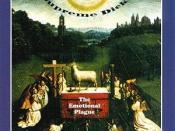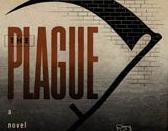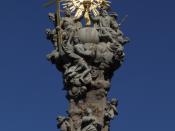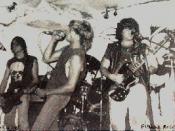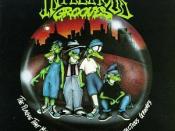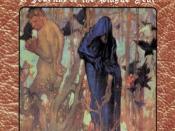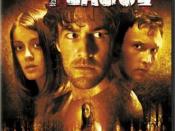THE PLAGUE The Plague by Albert Camus won the author a Nobel Prize for literature, and with good reason. The story, about an outbreak of the bubonic plague in Oran and the isolation Oran is forced into as a result, examines the human condition under a unique light. Rieux, the narrator, shows professionalism and character when dealing with the disease. He understands his job as not only a doctor, but also a human being. He struggles with which should come first. Many of the characters struggle with their own selves as well. Camus allows the reader inside the minds of these characters to witness these struggles first-hand. These characters have many different philosophies in dealing with the indifference. While Rieux demonstrates modest humanism, others use religion, fatalism and liberalism to confront their struggles.
In order to understand Rieux's humanism one must define humanism. It is a mode of thought that the human is in priority.
The human cannot be forgotten or disgraced. The humanist cares for people and shows compassion and understanding. Rieux demonstrates this perfectly when talking with Rambert. Rambert wants to leave the town. Rieux, being the professional, denies him a pass. However, the humanistic personality allows him to feel sorry for Rambert. He understood his predicament and wanted Rambert to keep him informed of his progress. Rambert takes offense to this without knowing that Rieux was in the same, if not worse, situation. During a conversation with Panteloux, Rieux states, "Salvation's a much too big word for me. I don't aim so high. I am concerned with man's health; and for me his health comes first." This is a humanistic statement and shows his respect for the human. During the beginning of the novel Rieux was very professional; however, toward the end he is more concerned with the people than the disease.
Unlike Rieux, Paneloux uses religion to understand the disease. He reacts to the plague through his religious beliefs. Toward the beginning of the novel, Paneloux is a steadfast Christian. He proclaims in his first great sermon during the epidemic that The Plague is God-sent, brought upon the evildoers of society to punish them for their sins. He later involves himself in the struggle against the plague, helping men such as Rieux and Tarrou, and putting his faith to the test. The test reaches its utmost when the characters are forced to watch the slow, tortured death of an innocent child. How could something sent to punish sin afflict a child? The child had done no wrong, yet the group cannot do more than to sit and wait helpless as the child dies before them. Shortly after this event, Paneloux begins to write another sermon. This one differs from the first. He reflects in his sermon on what he has witnessed. He tries to find a reason for the death of the child. Paneloux goes on to explain his reason. During the second sermon he affirms that the plague is not sent by God; it is part of an evil which is present in the universe and which the Christian must confront. The plague had changed his thoughts and beliefs. This disease changed many of the characters and brought them back to reality.
Tarrou begins in the story as an outsider. He is not from the town of Oran; he is not on business there: apparently, he is vacationing. When The Plague strikes the town, Tarrou has no outside motivation to help the people of the town. Yet he realizes his responsibility towards others and acts on that responsibility. Tarrou simply hates to see human suffering ignored by the masses. To correct this, Tarrou gathers together his sanitary squads, men who otherwise may not have been so eager to do the jobs they now must face daily. One might assign a heroic quality to Tarrou, that he is larger than life, a great man in a troubled time. But he believes he is no hero. He believed what he did every man can do. He stated, "I don't believe in heroism; I know it's easy ... What interests me is living and dying for what one loves." Tarrou is not a great man, but he is a man. He lives and acts as he sees right. Tarrou is an essential character in the novel because he asks Rieux questions that cause him to question the motives of himself and the others.
To look at this story from a fatalist point of view one must understand fatalism. Fatalism is the belief that everything happens for a reason and that one has no control. Each person has a destiny and can do nothing to change it. Fatalism is referred to as an inevitability of suffering and the tragedies of life. Fatalist would see the plague as a destiny for the town of Oran and its inhabitants. They would see the efforts of Rieux and others as a waste of time. To a fatalist everyone that died was given this fate and could not change it no matter how hard the efforts of the doctors. Unlike Rieux and Tarrou, who believed one could do his best to do what was right and eventually defeat the plague, and unlike Paneloux, who believed God controlled the plague, fatalist would see it as a cruel fate.
This novel can be viewed three ways. The novel can be viewed as an allegory to the Nazi occupation of France during W.W. II. The novel can be symbolic in general, with the objects of the symbols not specific events or items but general, dealing with humanity. But most importantly, the novel deals with the fight against indifference. The Plague presents a perfect situation in which all human beings can unite to fight the inhuman. Camus uses his characters extremely well to convey the human reaction to a catastrophe. This novel makes people view their own lives and how they would react in a similar situation. It makes one ponder if there is an event that can alter the lives of so many people so fast. After reading the novel one might ask, "Is there something out there that could send people to their ultimate limit "death"?" The view expressed by each character greatly demonstrates the effects of the plague and the reality of death. It also shows that no matter what the human goes through the self always prevails.
